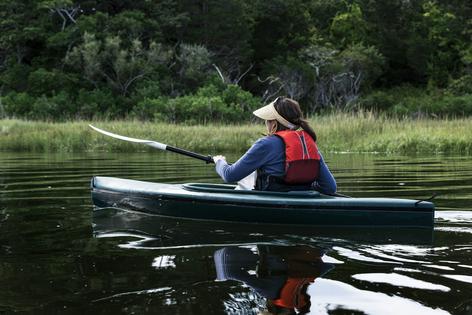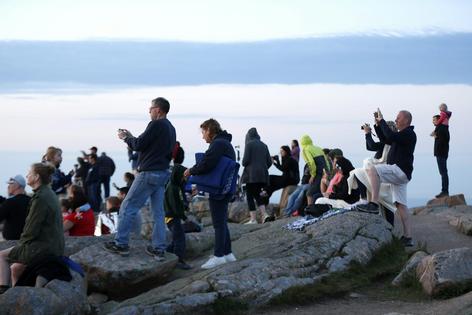Americans love nature but don’t feel empowered to protect it, new research shows
Published in News & Features
Climate change has been in the news for more than 40 years. It’s typically covered as a scientific or political issue. However, social scientists like me have found that feelings and values are what drive people toward broad, collective change – not charts, graphs or images.
Surveys confirm that the majority of Americans now believe that climate change is real. But many adults seem to feel too exhausted, defeated or powerless to do anything about it.
I am leading a large multiyear research project funded by the National Science Foundation that examines how to tap into morals, ethics and spirituality to create enduring behavioral shifts on this issue. In the pilot study for this project, which has not been published yet, we recently surveyed 275 U.S. adults to understand their relationship with and feelings toward the natural world.
This is a first step toward understanding how to start communicating differently about climate change. Climate change is altering weather patterns, temperatures and seasons, which people are now beginning to feel in nearly all locations in the world.
Many people said that when they thought of nature, it raised happy memories of climbing trees, stomping in puddles or watching sunsets. But underneath, they described fraught relationships with the environment – a tense blend of love, longing, guilt and worry.
We used an open-ended survey that allowed respondents to answer however they wished, without predetermined choices. For example, we asked “What is your personal relationship with nature?” and gave respondents a blank box to write down their own interpretation.
Open-ended questions are coded line by line by a team of researchers – a time-consuming process that limits the number of survey participants. Large surveys typically use close-ended questions that are more straightforward to analyze and are easier to administer to larger numbers of people.
However, using this approach meant that responses were not limited or prompted by a researcher’s ideas. The themes we found arose out of participants’ own thoughts and feelings.
To understand people’s relationships with nature, we asked several questions. In one set we asked, “How are humans and nature related? What is the role of humans in nature?” Over half of respondents (53%) noted that we should care for and preserve Earth. Some 45% explicitly mentioned the benefits of nature for human health and well-being. And 27% discussed how humans depend on Earth and its resources.
About a quarter of responses (26%) mentioned that humans can choose to be positive or negative forces in nature. This was closely followed by statements that humans take too much from nature (23%).
When analyzing another question, “What is your personal relationship with nature?” we noted prominent themes and how participants tended to connect them to one another. For instance, participants reported that, to them, nature represented beauty, health, joy, childhood and escape.
To connect with nature, respondents said they commonly engaged in activities such as taking walks outdoors, going camping, watching sunsets or gardening. However, many said that barriers – such as time constraints, lack of physical access or being distracted by technology – prevented them from connecting with nature in the ways they wanted.
Underlying all of this were strong feelings of love, longing, worry and guilt. These emotions showed up most commonly in responses – usually through a literal statement, although sometimes by alluding to the emotion.
When discussing love, participants were most direct. They usually simply said, “I love it, honestly” or “Love it.” Longing was often expressed in slightly more varied ways, such as stating “It makes me sad to not be outside as much as I would hope to,” or “Wish I could go hiking and other things to get closer.”
Worry and guilt emerged in responses such as: “I try my best to respect the environment and take care of it. I know I can do better”; “I take care of it the best I can, but I wouldn’t say I make any large gestures either”; and “I don’t appreciate it enough.” One person simply responded: “Appreciation, respect, care, sadness.”
This question had asked, “What is your personal relationship with nature?” We did not guide respondents to list their feelings. Yet, the responses were laden with emotions.
The way in which people talk about or portray an issue – their words, symbols, phrases or images – is called a frame. Frames highlight a subset of an issue, which then generally becomes people’s primary way of thinking about something.
Positive self-efficacy frames – in other words, a belief that people can make a difference – have been largely absent from conversations about climate change. Political or distant environmental frames are more common.
For example, prominent images typically contain political figures or distant environmental impacts, such as smokestacks or melting ice. These tend to leave people feeling powerless or feeling that they have little to offer.
Our survey findings reflect these frames. People feel longing, guilt and worry toward the environment, with virtually no mention of hope, excitement or empowerment.
Social scientists have been learning through climate change research that some emotions paralyze and others catalyze. Is it possible to reduce paralysis and match love for nature with hope?
Other surveys show that Americans’ concern for future generations is rising, that they are worried about harm to plants and animals and that nearly all groups see human actions as the cause of these concerns. However, as long as people lack a personal sense that they have the ability to make change, they won’t take steps such as telling political leaders to act.
Our next phase of research will build on findings from this survey by examining how ethical, moral and spiritual considerations influence behavior. We want to know what’s required for these ideas to invoke a sense of personal empowerment that’s necessary to take action.
When someone focuses on their connection with one another and future generations, it draws on a different set of ethics and sense of self – and that can motivate action.
This article is republished from The Conversation, a nonprofit, independent news organization bringing you facts and trustworthy analysis to help you make sense of our complex world. It was written by: Jessica Eise, Indiana University
Read more:
Pew’s new global survey of climate change attitudes finds promising trends but deep divides
US national parks are crowded – and so are many national forests, wildlife refuges, battlefields and seashores
Should we protect nature for its own sake? For its economic value? Because it makes us happy? Yes
Jessica Eise receives funding from the National Science Foundation to explore how to create enduring change in environmental public behavior to support actions that will effectively address climate change and its impacts on society.











Comments